Posted on October 15, 2010 by The Orwell Prize -

Paul Lewis is Special Projects Editor for The Guardian. He was named Reporter of the Year at the British Press Awards 2010 and won the 2009 Bevins Prize for outstanding investigative journalism. He previously worked at the Washington Post as the Stern Fellow.
Submitted articles
Other links
Posted on October 15, 2010 by Eric Blair -
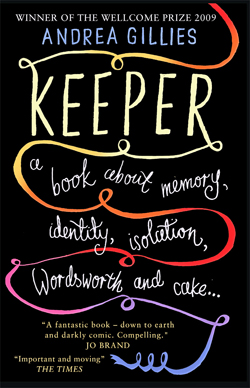
Can our personalities be taken away from us? Are memory and identity mutually dependent? What exactly is the soul? Three years ago, Andrea Gillies, a writer and mother of three, took on the care of her mother-in-law Nancy, who was in the middle stages of Alzheimer’s disease. This newly extended family moved to a big Victorian house on a headland in the far, far north of Scotland, where the author failed to write a novel and Nancy, her disease accelerated by change, began to move out of the rational world and into dementia’s alternative reality.
This book is a journal of life in this wild location, in which Gillies tracks Nancy’s unravelling grasp on everything that we think of as ordinary, and interweaves her own brilliantly cogent investigations into the way Alzheimer’s works. For the family at the centre of this drama, the learning curve was steeper and more interesting than anyone could have imagined.
Winner of the Orwell Prize 2010 and the inaugural Wellcome Prize 2009.
Posted on October 15, 2010 by The Orwell Prize -

Peter Hitchens is a columnist and reporter for the Mail on Sunday, having previously reported from Moscow and Washington for the Daily Express. He has contributed to other publications, such as Prospect and The Guardian, authored documentaries on Channel 4 and the BBC, and appeared elsewhere on radio and television. Peter has also written a number of books, including The Rage Against God, The Cameron Delusion, The Broken Compass, The Abolition of Britain, The Abolition of Liberty and A Brief History of Crime.
Submitted articles
Other links
Posted on October 15, 2010 by Eric Blair -
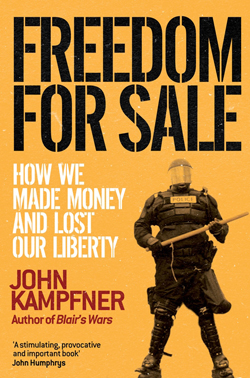
Why do so many people around the world appear willing to give up freedoms in return for security or prosperity? For the past 60 years it had been assumed that capitalism was intertwined with liberal democracy. But what happens when both are undermined? Governments globally have drawn up a new pact with their peoples: repression is confined to the few who openly challenge the status quo. The rest of the population can enjoy freedom to live more or less as they wish, and to make and spend their money. This is the difference between public freedoms and private freedoms. We choose different freedoms we are prepared to cede. We all do it. Freedom for Sale will set a new agenda. It will crucially ask why so many intelligent and ambitious citizens around the world seemed prepared to sacrifice freedom of the press and freedom of speech in their quest for wealth.
Posted on October 15, 2010 by The Orwell Prize -

A woman in a township in Zimbabwe is surrounded by throngs of dusty children but longs for a baby of her own; an old man finds that his job making coffins at No Matter Funeral Parlour brings unexpected riches; a politician’s widow quietly stands by at her husband’s funeral watching his colleagues bury an empty coffin. Petina Gappah’s characters may have ordinary hopes and dreams, but they are living in a world where a loaf of bread costs half a million dollars; a country expected to have only four presidents in a hundred years; and a place where people know exactly what will be printed in the one and only daily newspaper because the news is always, always good. In her spirited debut collection, Zimbabwean author Petina Gappah brings us the resilience and inventiveness of the people who struggle to live under Robert Mugabe’s regime. Despite their circumstances, the characters in An Elegy for Easterly are more than victims; they are all too human, with as much capacity to inflict pain as they have to endure it. They struggle with larger issues common to all people everywhere: failed promises, unfulfilled dreams and the yearning for something to anchor them to life.
Posted on October 15, 2010 by The Orwell Prize -
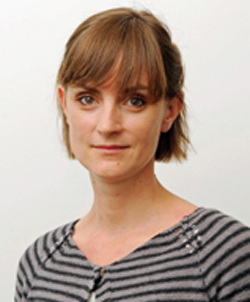
Amelia Gentleman writes on social affairs for The Guardian. She was nominated for the Martha Gellhorn journalism award in 2010 as well as the Orwell Prize. Previously she was New Delhi correspondent for the International Herald Tribune. She won first prize for feature and comment writing in the 2007 Amnesty International Hong Kong Human Rights Press Awards. She won the Ramnath Goenka prize 2007 for best foreign correspondent covering India. Formerly Paris and Moscow correspondent for The Guardian.
Submitted articles
Other links
Posted on October 15, 2010 by Eric Blair -

On the eve of the twentieth anniversary of the Rushdie fatwa, From Fatwa to Jihad tells, for the first time, the full story of this defining episode and explores its repercussions and resonance through to contemporary debates about Islam, terrorism, free speech and Western values. When a thousand Muslim protestors paraded through a British town with a copy of Salman Rushdie’s The Satanic Verses before ceremoniously burning the book, it was an act motivated by anger and offence as well as one calculated to shock and offend. It did more than that: the image of the burning book became an icon of the Muslim anger. Sent around the globe by photographers and TV cameras, the image announced a new world. Twenty years later, the questions raised by the Rushdie affair – Islam’s relationship to the West, the meaning of multiculturalism, the limits of tolerance in a liberal society – have become some of the defining issues of our time. Taking the Ayatollah Khomeini’s fatwa as his starting point, Kenan Malik examines how radical Islamhas gained hold in Muslim communities,how multiculturalism contributed to this, and how the Rushdie affair transformed the very nature of the debate on tolerance and free speech.
Posted on October 15, 2010 by The Orwell Prize -
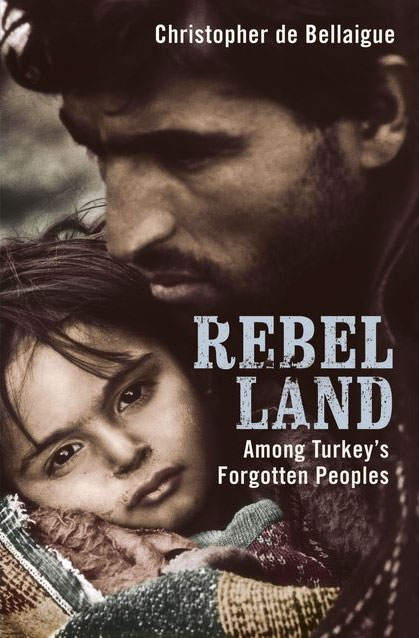
What is the meaning of love and death in a remote, forgotten, impossibly conflicted part of the world? In Rebel Land the acclaimed author and journalist Christopher de Bellaigue journeys to Turkey’s inhospitable eastern provinces to find out. Immersing himself in the achingly beautiful district of Varto, a place left behind in Turkey’s march to modernity, medieval in its attachment to race and religious sect, he explores the violent history of conflict between Turks, Kurds and Armenians, and the maelstrom, of emotion and memories, that defines its inhabitants even today. The result is a compellingly personal account of one man’s search into the past, as de Bellaigue, mistrusted by all he meets, and particularly by the secret agents of the State, applies his investigative flair and fluent Turkish to unlock jealously-guarded taboos and hold humanity’s excesses up to the light of a very modern sensibility.
Posted on October 15, 2010 by The Orwell Prize -

John Arlidge is a freelance journalist who writes for the Sunday Times in London and for Conde Nast in New York.
Submitted Articles
Other links
Posted on October 15, 2010 by The Orwell Prize -
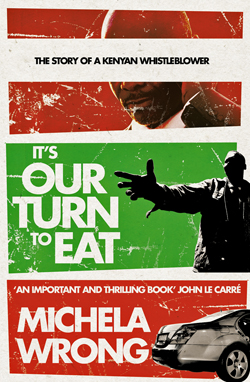
A gripping account of both an individual caught on the horns of an excruciating moral dilemma and a continent at a turning point. When Michela Wrong’s Kenyan friend John Githongo appeared one cold February morning on the doorstep of her London flat, carrying a small mountain of luggage, it was clear something had gone very wrong in a country regarded until then as one of Africa’s few budding success stories. Two years earlier, in the wave of euphoria that followed the election defeat of long-serving President Daniel arap Moi, John had been appointed Kenya’s new anti-corruption czar. In choosing this giant of a man, respected as a longstanding anti-corruption crusader, the new government was signalling that it was set on ending the practices that had made Kenya an international by-word for sleaze. Now John was on the run, having realised that the new administration, far from breaking with the past, was using near-identical techniques to pilfer public funds. John’s tale, which has all the elements of a political thriller, is the story of how a brave man came to make a lonely decision with huge ramifications. But his story transcends the personal, touching as it does on the cultural, historical and social themes that lie at the heart of the continent’s continuing crisis. Tracking this story of an African whistleblower, Michela Wrong seeks answers to the questions that have puzzled outsiders for decades. What is it about African society that makes corruption so hard to eradicate, so sweeping in its scope, so destructive in its impact? Why have so many African presidents found it so easy to reduce all political discussion to the self-serving calculation of which tribe gets to ‘eat’? And at what stage will Africans start placing the wider interests of their nation ahead of the narrow interests of their tribe?
Posted on October 18, 2009 by The Orwell Prize -

The blog of a pseudonymous English detective. After winning the first-ever Orwell Prize for Blogs, Night Jack was revealed to be Richard Horton by The Times following a landmark High Court ruling, The Author of a Blog vs Times Newspapers Limited.
Submitted blogposts
All posts via The Salted Slug’s, Nightjack Archive.
Other links
Posted on October 17, 2009 by The Orwell Prize -
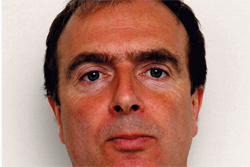
Peter Hitchens is a columnist and reporter for the Mail on Sunday, having previously reported from Moscow and Washington for the Daily Express. He has contributed to other publications, such as Prospect and The Guardian, authored documentaries on Channel 4 and the BBC, and appeared elsewhere on radio and television. Peter has also written a number of books, including The Rage Against God, The Cameron Delusion, The Broken Compass, The Abolition of Britain, The Abolition of Liberty and A Brief History of Crime.
Submitted articles
Other links
Posted on October 17, 2009 by The Orwell Prize -
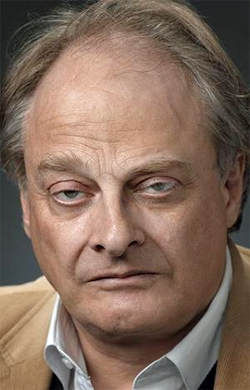
Awarded the Orwell Prize for work published by the London Review of Books and The Independent. Patrick Cockburn was born in Cork in 1950. He divides his time between London and Iraq and is one of the very few Western journalists who still travel outside the Green Zone in Baghdad without an armed escort. He is a foreign correspondent for The Independent and has worked in Moscow, Washington, Jerusalem, Belfast, Beirut and Baghdad. His books include The Occupation, The Broken Boy, and Muqtada al-Sadr and the Fall of Iraq, and he was the recipient of the Martha Gellhorn Award in 2005 and the James Cameron Award in 2006.
Submitted articles
Other links
Posted on October 17, 2009 by The Orwell Prize -

Catherine Bennett is a columnist for The Observer, having previously written for its sister paper, The Guardian. Her columns focus on politics and culture.
Submitted articles
Other links
Posted on October 17, 2009 by Eric Blair -

From the 1960s to the 1980s, Sweden was an affluent, egalitarian country envied around the world. Refugees were welcomed, even misfit young Englishmen could find a place there.
Andrew Brown spent part of his childhood in Sweden during the 1960s. In the 1970s he married a Swedish woman and worked in a timber mill while helping to raise their small son. Fishing became his passion and his escape. In the mid-1980s his marriage and the country fell apart. The Prime Minister was assassinated. The welfare system crumbled along with the industries that had supported it. Twenty years later, Andrew Brown travelled the length of Sweden in search of the country he had loved, and then hated, and now found he loved again.
Posted on October 17, 2009 by The Orwell Prize -

As well as writing a column for The Observer, Henry Porter has published six novels, including the recent The Dying Light and Brandenburg (which won the Ian Fleming Crime Writers’ Association Steel Dagger as the best thriller of 2005). He has also written one non-fiction title, Lies Damned Lies, a study of truthfulness in British journalism. He has written for the Sunday Times, The Guardian, Daily Telegraph, Sunday Telegraph and the Evening Standard. He is the London editor of Vanity Fair magazine.
Submitted articles
Other links
Posted on October 17, 2009 by The Orwell Prize -

Peter Oborne is a former political commentator of the Spectator, the Daily Telegraph and Daily Mail. He now writes about politics for Open Democracy and Middle East Eye. He is the author of ‘The Triumph of the Political Class’, and ‘The Rise of Political Lying’ as well as a biography of the cricket Basil D’Oliveira.
Posted on October 17, 2009 by The Orwell Prize -

The Independent’s Jerusalem correspondent since 2004, Donald Macintyre was the paper’s Chief Political Commentator for eight years and before that Political Editor of The Independent and The Independent on Sunday. He has written for the Daily Express, Sunday Times, The Times and Sunday Telegraph.
Submitted artcles
Other links

















